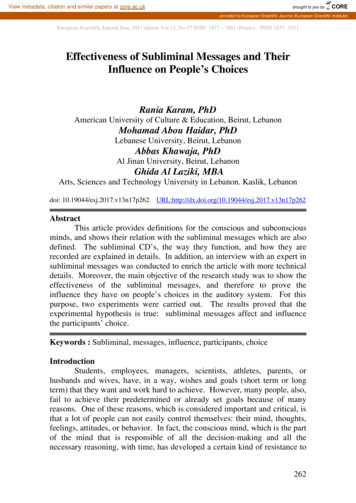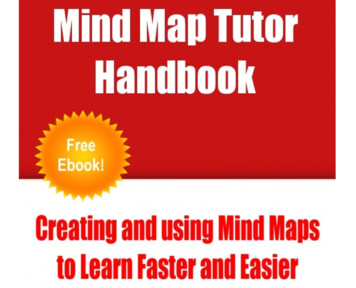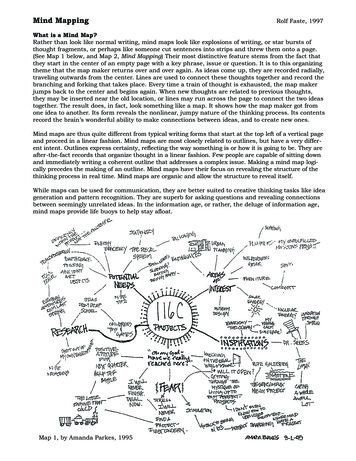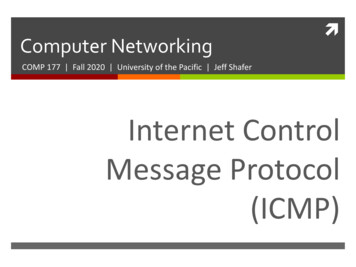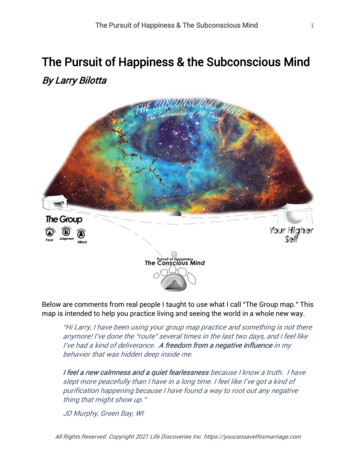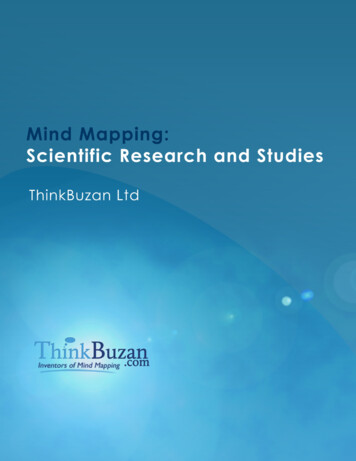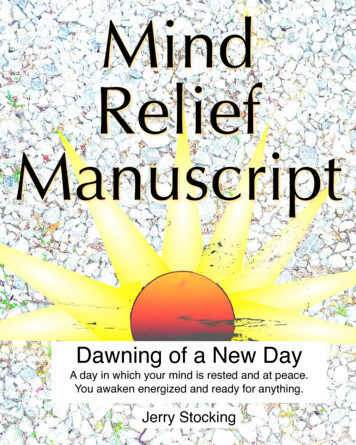
Transcription
Communicate at Your Best MindTools.comCommunicate at Your Best! Mind Tools Ltd, 2007-2011.1
Communicate at Your Best MindTools.comCommunicate at Your BestA Mind Tools WorkbookThis e-book is published by Mind Tools Limited, of2nd Floor, 145-157 St John St, London, EC1V 4PY.Version 1.2Copyright Mind Tools Ltd, 2007-2011. All rights reserved.This e-book is protected by international copyright law.It may only be used by members of the Mind ToolsCareer Excellence Club or under corporate license.Cover image iStockphoto/SPrada Mind Tools Ltd, 2007-2011.2
Communicate at Your Best MindTools.comContentsIntroduction . 4How Do We Communicate? . 51. Listening Skills . 6Listening Skills Self-Assessment. 7Improving Your Listening Skills . 82. Report-Writing Skills . 9Report-Writing Self-Assessment . 11Improving Your Report-Writing Skills . 123. Presentations Skills . 13Presentation Skills Self-Assessment . 14Improving Your Presentation Skills . 154. Email-Writing Skills. 16Email-Writing Self-Assessment . 17Improving Your Email-Writing Skills . 185. Meeting Management Skills . 19Meeting Management Self-Assessment. 20Improving Your Meeting Management Skills . 21Have you found this e-book useful? . 22 Mind Tools Ltd, 2007-2011.3
Communicate at Your Best MindTools.comCommunicate at Your BestIntroduced by Mind Tools CEO, James ManktelowWelcome to ourCommunicate atYourBestWorkbook!Communication is acriticalskillforalmost everythingwe do. Whetheryou’re speaking toanother person orto a group, giving aformal presentation,chairing a meeting, or writing emails or reports,you’re putting your communication skills towork. And rightly or wrongly, your argumentsand ideas have a much greater impact if they’represented well than if they’re presented poorly.You can probably think of many examples ofineffectivecommunication:amumbledpresentation, where you left the roomthoroughly confused; a rambling meeting; along email containing multiple, unclearmessages; or a badly written report, wherespelling and punctuation were so annoyinglypoor that you found it hard to make out theunderlying message.No matter how good we are – or think we are –at communicating, most of us can benefit frompaying regular attention to this. When we keepour communication skills in absolutely tip topcondition, we see improvements in theeffectiveness of almost everything we do. So,which aspects of communications would youbenefit from working on, and how can youimprove those skills?Our workbook helps you answer thesequestions: First, it explains key issues in severalimportant communication skill areas. Then itguides you through an assessment of yourcurrent communication skills, helping youidentify areas for improvement.It then gives tips and tools helping you improveeach aspect of communication, and finallypoints you towards further Mind Toolsresources that help you boost your skills. Withall of this, this workbook helps you bring yourcommunications skills up to full effectiveness,so that you can communicate at your very best,every day.Enjoy it!Poor communication makes an impact – but notthe impact that was hoped for!So, what impact are YOU making when youcommunicate?HowgoodareYOURcommunication skills? Mind Tools Ltd, 2007-2011.James Manktelow, CEO,MindTools.com4
Communicate at Your Best MindTools.comHow Do We Communicate?When we think about communicating, we oftenfocus on one side of the communicationprocess – what and how we’re communicating,and on the impression we’re creating. Butcommunication is, of course, a two-wayprocess. It involves much more than simplywriting or speaking; it also involves reading,watching or listening – by the audience withwhom you are communicating.When you communicate, what are you trying toachieve? Speaking, writing and presenting areways of helping someone else to understandthe information and ideas that are in your mind.It sounds obvious, but it’s well worth remindingyourself of this regularly!The path of an idea from your mind to someoneelse’s is known as the CommunicationsProcess, and it’s shown in the diagram below:You can read more about the communicationsprocess, in our “Introduction to Communication”article here: hen communications are ineffective, it meanssomething has gone wrong at one or more of Mind Tools Ltd, 2007-2011.the stages in this process. Effectivecommunications means thinking through everystage and so reducing the chances of thishappening. For example, are your ideas clear,well-structured and supported by good data?Have you done everything you can tocommunicate them clearly? Have you checkedthat your channel is working correctly, from atechnical perspective? Have you doneeverything you can so that your recipient canpay attention to your message? And have youchecked the level to pitch your message at, sothat you’re confident that your receiver has theknowledge and experience needed tounderstand and use your message?The rest of this workbook looks at five keyforms of communication and helps you thinkthrough what you can do to make thecommunication process work effectively. Welook in turn at listening, report-writing,presentations, writing email, and managingmeetings. The first of these – listening –involves decoding, while the remaining fourbelong in the encoding part of the overallprocess.5
Communicate at Your Best MindTools.com1. Listening SkillsWhen you listen, do you really HEAR what theother person is saying?Because listening involves decoding whatsomeone else is saying, it’s a great place tostart improving your communication skills. Weknow that communication can break down atany point in the Communications Process but,particularly in one-to-one discussions, problemsoften arise in this decoding stage. By thinkingabout and working on our listening, not only dowe improve our own listening skills, but also weget an appreciation of the challenges we faceas speakers.Too often, we don’t really listen to what theother person is saying. Perhaps we’ve come tothe conversation with pre-conceived notions ofwhat they’re going to say, and we occupyourselves with formulating our response whilethey’re talking. Or perhaps we think weunderstand what they’re saying, but in factwe’ve mis-interpreted the words they’ve used.Equally, the other person may think you haven’tlistened, because your body language hasindicated disinterest. If they think this, even ifyou were actually listening attentively, they maygo away from the conversation feelingdissatisfied.Being a good listener is just as important a skillas speaking, writing, and giving presentations.Good listening, supplemented by asking goodfollow-up questions, plays a key part in buildingrapport and avoiding misunderstandings, Mind Tools Ltd, 2007-2011.particularly if the other person isn’t expressinghim- or herself all that clearly.The higher the stakes in a conversation, themore critical it is that you’re certain you haveunderstood the other person’s point of viewcorrectly and fully. So it’s particularly importantto think about listening well when you’renegotiating, taking instructions or dealing with akey customer or contact.Top Tips for Effective Listening Devote all your attention to listening –don’t try to think about your response atthe same time. Use attentive body language to make surethat the other person realizes that you arelistening to what they are saying. Repeat back what you think the otherperson has said, using your own words,and use checking questions to ensure youreally understand what the other personmeans. “Listen” to their body language too. Whatfeedback do you have about how theconversation is going? Be comfortable about saying that you willrespond later once you’ve had a chanceto think about what the other person hassaid. It is often better to wait and give awell-considered response than to rush inwith immediate thoughts, just because theother person wants a quick answer.6
Communicate at Your Best MindTools.comListening Skills Self-AssessmentFind out how effective you are at listening now by going through the skills listed in the table below, andchecking the appropriate box. Are you already listening well, or is this something you could improveupon?Listening SkillI do this wellalready ( )I could improveon this ( )Concentrating 100% on what the other person is saying.Using your own body language to show them that you arelistening with your full attention.Making sure you understand what the speaker means by anyjargon words they have used.Using questions appropriately to ensure that you haveunderstood the situation fully.Making sure that the speaker knows you have listened to theirmessage.Waiting until the speaker has finished what they have to saybefore you start preparing your response mentally.Only responding when you are in a position to give aconsidered response.Making sure you really understand what the speaker means byrepeating the other person’s key messages in your own words.Actively seeking feedback.Avoiding getting into a debate when you are receivingfeedback.Use the space below to make notes about these or other listening-related skills you’d like toimprove. Mind Tools Ltd, 2007-2011.7
Communicate at Your Best MindTools.comImproving Your Listening SkillsHere are some more resources to help youwork on the areas for improvement in yourlistening skills:Active Listening: Hear what people are reallysayingDo you really listen to other people or do youjust hear what you want to hear? Find out thebenefits of being an active listener, and how todevelop this tmEmpathic Listening: Going beyond activelisteningMake sure you really understand what someoneelse is telling you, and that you’ve drawn the fullstory out of them, by using this powerfullistening ning.htmBody Language: Understanding non-verbalcommunicationRecognizing and understanding non-verballanguage is key to effective communication.You can lead, inspire and motivate others moreeffectively by understanding and acting upontheir non-verbal language. Learn how in thisarticle.www.mindtools.com/pages/article/Body Language.htmGiving and Receiving Feedback: Keepingteam member performance high, and wellintegratedFeedback is designed to help improve thingsnext time round, but if you go about it the wrongway, it can make things worse rather thanbetter. Find out how to give – and receive –feedback effectively.www.mindtools.com/pages/article/newTMM 98.htmQuestioning Techniques: Asking questionseffectivelyHow you ask a question has a massive impacton the answer that the other person gives you.Learn what type of question to use when, fromopen and closed questions, to funnel questions,probing questions, leading question andrhetorical questions.www.mindtools.com/pages/article/newTMC 88.htm Mind Tools Ltd, 2007-2011.8
Communicate at Your Best MindTools.com2. Report-Writing SkillsWritten reports are an essential form ofcommunication in many areas of business.Whether you’re reporting on team progress,writing up a client meeting, or describing howyour project is going, your objective is toexpress all of the relevant information in such away that the reader can understand it quicklyand easily.The exact format of your report depends onseveral factors. These include its purpose, thelevel of detail required and the formalityneeded. For example, if your report is a detailed50 page document, it will benefit from extrastructure such as a table of contents andnumbered sections. But such additions wouldclutter up a two-pager about yesterday’sbrainstorm session.Whatever the length of your report, structure isstill an essential feature of a business report(you’re not writing a novel here!) Includesummaries, and use headings, bullets, tablesand charts to break up the text and presentinformation as concisely as possible. This willhelp make your report more effective for itsreaders, and you’ll reduce the chance of themskipping a key point.Also, make sure that your language isappropriate for the audience you’re writing it for.If you’re a programmer and you’re writing forother programmers, it may well be efficient touse highly technical jargon. But if there’s anychance that your audience might include nontechnical people, the use of jargon risks bothmisunderstandings and losing your reader’sinterest. And when that happens, you’reperceived as a poor communicator.With the right structure in the place andappropriate language, you’ll be well on the roadto creating a good report. However, make sureyou don’t spoil it with sloppy spelling orpunctuation. While some people no longer findthis important, there are still many who caredeeply about this. Paying attention to spellingand punctuation continues to be good practiceand makes for a professional report. Lower your Mind Tools Ltd, 2007-2011.standards on these details and you again riskbeing perceived as sloppy, and a poorcommunicator.Top TipsWritingforEffectiveReport Before you start writing the report, spenda few minutes thinking about how you’llstructure it to present your ideas clearlyand logically. On all but the shortest reports, include anExecutive Summary at the beginning tomake life easier for busy readers (thisshould be a maximum of one page long).Although it’s at the beginning of thereport, this will normally be the last part ofthe report that you’ll write. Break your text up with clear subheadings, and with bullets and numberedlists where appropriate. This also makes iteasier for the reader to skim your reportsquickly. Start a new paragraph for each new pointor thought. If in doubt, start a newparagraph! When you’re proof-reading your work, tryreading it out loud. If you find yourselfgetting “tangled up” as you read, considerrestructuring that sentence so that it’seasy to read. And if you find yourselfrunning out of breath in a sentence,consider breaking it into two or moreseparate sentences. Simple sentences are easy to understand.Long, convoluted sentences, with amyriad of sub-clauses and extravagant orcomplex words, are challenging, and riskdiverting and confusing the reader withtheir unwarranted complexity. People areoften confused by longer sentences. Also, make sure you check the headingstoo. It’s easy to assume they must beerror-free just because they’re short, bigand bold.9
Communicate at Your Best MindTools.com Always include page numbers ondocuments that are likely to be printed –just in case the reader drops the pages. Mind Tools Ltd, 2007-2011. Don’t write one single word more than youhave to.10
Communicate at Your Best MindTools.comReport-Writing Self-AssessmentFind out how good your report writing skills are by going through the skills listed in the table on the nextpage. Check the appropriate box depending on whether you’re already using the skill well, or whetherit’s something you could improve upon.Report-Writing SkillI do this wellalready ( )I could improveon this ( )Structuring your report.Using an appropriate level of detail.Pitching your language at an appropriate technical level foryour audience.Proof-reading your work.Checking spelling and punctuation carefully.Using bullet points and numbered lists effectively.Presenting data clearly in tables, charts, graphs or diagrams.Use the space below to make notes about these or any other specific report-writing skillsyou’d like to improve. Mind Tools Ltd, 2007-2011.11
Communicate at Your Best MindTools.comImproving Your Report-Writing SkillsWhat areas of report writing are you going towork on? These articles and resources will helpyou improve your skills:Writing Skills: Before you write it down,know thisWhy shouldn’t you write “we need 3 moreproject analysts”? Make use of this Jargon Busting: Communicating withoutcreating barriersActually, jargon has its place, but it can alsospread beyond its usefulness very easily. Learnabout common jargon traps, and how to avoidbeing caught out by them.www.mindtools.com/CommSkll/JargonBusting.htm Mind Tools Ltd, 2007-2011.Chunking: Grouping Information so it’smore easily understoodFind out how you can structure information tomake it easier to absorb and remember, andlearn why you should never include more thannine bullet points in a list.www.mindtools.com/CommSkll/Chunking.htmCharts and Graphs: Choosing the rightformatSpreadsheets offer several different formats ofcharts and diagrams, but it's not always obviouswhich one you should use. Learn the basics ofcharts and diagrams, and gain confidence inyour visual presentation skills.www.mindtools.com/pages/article/Charts and Diagrams.htm12
Communicate at Your Best MindTools.com3. Presentations SkillsWe’ve probably all sat through a poorpresentation. But what makes you leave theroom thinking “That was a complete waste ofmy time”? There are several reasons, and if youcan avoid them when you’re planning apresentation, you’ve got a good chance ofmaking YOUR next presentation effective andfull of impact.First of all, was the message pitched wrongly?At a sales conference, you need to tell salespeople about the key points about your newproducts, so they can convince others to buythem. The sales people don’t necessarily needto know about the clever new productionprocess, or how product development isfinanced.Next, the message may have been relevant, butwasitbadlydelivered?Commoncommunication barriers include a mumblingpresenter who didn’t look you in the eye, or onewho spoke too fast. Equally, perhaps thepresenter simply read from a terrifically detailedset of slides but you, sitting at the back of theroom, couldn’t read them because the text onthe slides was so small. Mind Tools Ltd, 2007-2011.Finally, was it ill-prepared? The material needsto be rehearsed, and the room and logisticsneed to be ready. The last thing any presenterwants to deal with is the fiasco of a projector notworking, or of people being unable to hear atthe back of a large room.TopTipsPresentationsforEffective Start by understanding why your audiencewant to listen to you. Do they want to beinformed, motivated or persuaded, or dotheywanttohavesomethingdemonstrated to them? Use three to five main points. Manypeople in your audience won’t rememberany more, anyway. Use a three part structure: Tell them whatyou’re going to tell them, then tell it tothem, then tell them what they’ve justbeen told. Use notes, but don’t read from them –they should just be reminders. If yourehearse enough, this won’t be a problem.So Be prepared, and practise, practise,practise!13
Communicate at Your Best MindTools.comPresentation Skills Self-AssessmentSo, how good are your presentation skills? Find out now by going through the skills listed in the tablebelow, and checking the appropriate box according to whether you think you’re already performing theskill well, or whether you think it’s something you could improve upon.Presentation SkillI do this wellalready ( )I could improveon this ( )Understanding the audience before you start working on yourmessage.Grabbing their attention with a powerful opener.Not trying to include too much information.Doing enough preparation.Practicing your presentation out loud.Creating PowerPoint (or other) slides that support yourpresentation rather than replace it.Talking at the right speed.Checking logistics and technical details thoroughly in advance.Use the space below to make notes about these or any other specific presentation skills you’dlike to improve. Mind Tools Ltd, 2007-2011.14
Communicate at Your Best MindTools.comImproving Your Presentation SkillsIt’s now time to work on the areas forimprovement in your presentation skills. Thesearticles and resources will help:Managing Presentation Nerves: Coping withthe fear withinDelivering a presentation is common source offear and nervous anticipation. Learn the tipsand tricks that help you channel your fear andnervousness,anddelivercool,calmpresentations that inspire and impress.The Presentation Planning ChecklistThere’s a lot to remember when you’re puttingtogether a presentation, so make sure you don’toverlook anything. Use our comprehensivechecklist to do mmunicating effectively with the rightcontent, delivery and slidesLearn more about the four principles of greatpresentations, and ensure that yours are alwaysengaging and ngGreatPresentations.htm Mind Tools Ltd, 2007-2011.15
Communicate at Your Best MindTools.com4. Email-Writing SkillsEmails have become one of the most commonforms of written communication. Yet how muchattention do we pay to writing them clearly andconcisely? The easier you can make it for thereaders of your emails to understand them andact on them quickly, the more effective you’ll be.(If they’re easy to process, you’ll get youranswer in minutes. If they’re difficult, beprepared to wait for days or weeks.)Writing an email is, in some ways, no differentfrom the old practice of writing a business letter.Email communication tends to be a little lessformal, but it still usually works best when it’swell-structured, and when writing is clear, wellspelled, and well punctuated. For example,there’s nothing necessarily wrong with starting abusiness email “Hi James”, but if James is asenior partner in a law firm, and you’ve nevermet him in person, it might not be appropriatefor this situation. If you start off on the wrongfoot, your reader may well be irritated before heor she even starts to consider your message,making them less open to what you’re saying.The first barrier to communication by email iswhere the recipient does not receive, or doesnot read it. But why would this happen? First, itmight not be delivered if the recipient’s mailsystem decides that it’s spam. For a legitimatemessage, the most likely reason for this tohappen is that there is no subject line.Even if a message without a subject line isdelivered, there’s still a chance that therecipient won’t read it. He or she might decidethat it is a “suspect” message, and delete it Mind Tools Ltd, 2007-2011.without opening it, just in case it is carrying avirus. And even if they don’t take such drasticaction, a message without a subject is hardlygoing to be the one jumping out at them from acrowded Inbox saying “open me first”.Top Tips for Effective Email Always include a subject line, and makesure it’s personalized to distinguish it fromgeneric spam messages. Make the subject line work hard for you. Ifyour message includes a deadline, putthis in the subject line – “Agenda for 3December meeting – please send itemsby 27 Nov.” And if you send out a regularemail, make sure you distinguish eachone “Program report Nov 07” rather than“Latest Program Report”. Stick to one topic per message. Thismakes your emails easier to handle by therecipient, who can delete or file each as itis read and actioned. (A great advantageof emails over old fashioned letters is thatit costs no more to send several instead ofone!) Only use Reply to All if everyone reallyneeds to read your reply. Write your message clearly and concisely,and format it so that it’s easy to read(using line spacing, bullets and so on).And make sure especially that any actionor response required is very clearlyexplained.16
Communicate at Your Best MindTools.comEmail-Writing Self-AssessmentFind out how effective you are at writing emails now by going through the skills listed in the table below,and checking the appropriate box according to whether you think you’re already performing the skillwell, or whether it’s something you could improve upon.Email SkillI do this wellalready ( )I could improveon this ( )Taking the same care over the quality of language andpunctuation as you would for a written letter.Always including a subject line.Using the subject line effectively.Covering only one topic per message.Addressing mails effectively and courteously.Choosing when to Reply and when to Reply to All.Clearly asking the recipient for the response or action required.Use the space below to make notes about these or any other specific email-writing issuesyou’d like sort out. Mind Tools Ltd, 2007-2011.17
Communicate at Your Best MindTools.comImproving Your Email-Writing SkillsIf you have identified areas for improvement inhow you could be more efficient about usingemail, these articles and resources should help:Effective Email: How to communicatepowerfully by emailEnsure that your emails are read in the firstplace and stay useful to the recipient.The Art of Filing: Managing your documentsor inbox and your timeWhile filing is boring, simple filing techniquescan help you become much more efficient atwork. Use these methods to save time – andhelp people quickly and efficiently.www.mindtools.com/pages/article/newHTE n.htm Mind Tools Ltd, 2007-2011.18
Communicate at Your Best MindTools.com5. Meeting Management SkillsThe saying that meetings “take minutes but lasthours” is all too true for most of us. But itdoesn’t have to be this way. Provided that theright people are invited to meetings, that theyare well planned, and that they try to achievethe right things, meetings are a powerful way ofmoving your team’s work ahead.meeting. If the meeting is a regular one, don’tjust use last time’s agenda with new dates.Instead, always construct a new one fromscratch, and only include the topics which haveto be covered and discussed in a meeting.Other material can be distributed before or afteras appropriate.One important way of ensuring that you’re notwasting people’s time is to invite only peoplewhose presence at the meeting is essential.Make sure that everyone invited is therebecause you need their input to the discussion,or need their agreement with its conclusions. Ingeneral, don’t invite people who simply “need toknow”: You can tell them what has beendecided after the meeting. (OK: if someone isan important “stakeholder” in the decision, albeitthey may not have much to input or power todecide, it may make sense to at least invitethem!)Top Tips for Managing MeetingsEffectivelyOnce your meetings develop a reputation forbeing effective, those you invite will make spacein their diaries, if at all possible, to attend. But ifyour meetings are renowned for being long andineffective, those key individuals you need maybe reluctant to come along, and you’ll be leftunable to achieve what you wanted withoutthem. Avoid using meetings simply to reportthings that just as effectively could bedistributed by paper on via email. Put the most important items near thebeginning on the Agenda, so that they getthe time they need. Allow less importantitems to be cut at the end if you have tofinish for a certain time. Step in quickly if the discussion startsgoing off-track. Don’t recap what you’ve already coveredfor latecomers – it just encourages themto be late next time. Limit participants to 12 at the most, tomaximizetheeffectivenessofdiscussions. Issue minutes promptly after the meeting,and clearly mark actions that people hadtaken away from the meeting.Chairing a meeting successfully demands quitea lot of active work before and during the Mind Tools Ltd, 2007-2011.19
Communicate at Your Best MindTools.comMeeting Management Self-AssessmentDo people look forward to your meetings or dread them? Find out how effective you are at managingmeetings now by going through the skills listed in the table below. Check the appropriate box accordingto whether you think you’re already performing the skill well, or whether it’s something you couldimprove upon.Meeting Management SkillI do this wellalready ( )I could improveon this ( )Planning your agenda items.Inviting only people who have to be there.Starting punctually.Stopping the discussion from wandering off-track.Encouraging all participants to contribute and controlling thosewho try to dominate the discussion.Ensuring that agreed actions are allocated to someone.Promptly distributing minutes that include action items.Use the space below to make notes about any other specific meeting management skil
important communication skill areas. Then it guides you through an assessment of your current communication skills, helping you identify areas for improvement. It then gives tips and tools helping you improve each aspect of communication, and finally points you towards further Mind Tools resources that help you boost your skills. With

